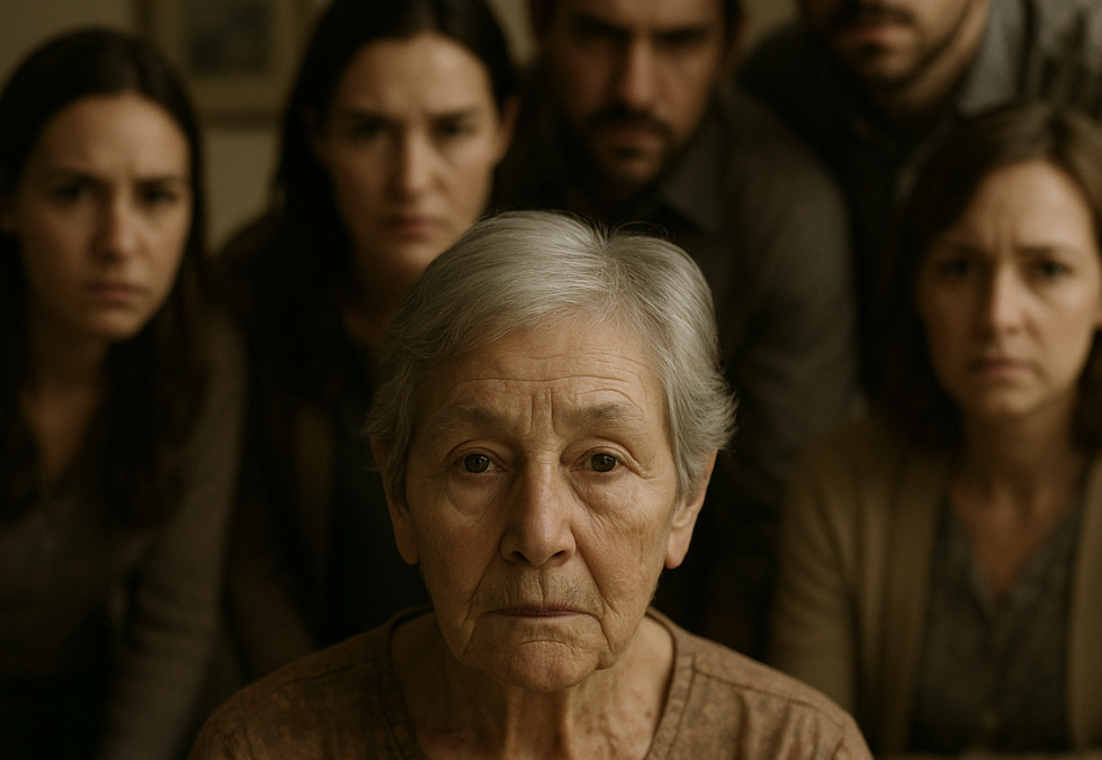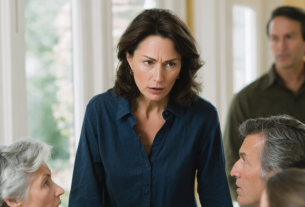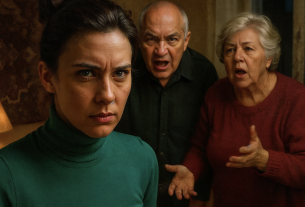— Back to your rich lady again?
My cousin Svetlana’s voice dripped with venom as I pulled on my coat in the hallway.
I buttoned it in silence. There was no point answering. This was their morning ritual.
“Leave her, Sveta,” Aunt Alevtina, her mother, drawled lazily from the room. “She’s busy. Handing out alms.”
Their laughter came loud and in sync.
“I just promised Aunt Liza I’d help seal her windows for the winter.”
“She sealed her windows back in ’47,” Svetlana wouldn’t let up, stepping into the hall. “Wasting your youth on an old crone who won’t leave you so much as a pair of ripped tights. That takes skill.”
She raked me up and down with her eyes, assessing my plain coat and boots.
“Not everyone’s goal is to snag an inheritance, Sveta.”
“Oh really? And what’s your goal? Spiritual enrichment while you mop floors in a Khrushchev-era flat?”
I picked up my bag. Inside were groceries for Yelizaveta Igorevna and a new book she’d asked for.
“My goal is to help someone close to me.”
“Close?” Aunt Alevtina squealed, appearing in the doorway. Her face twisted with some old grievance. “That ‘close one’ sold Granddad’s dacha—our common nest—to buy her little hole in the center! She was always out for herself, never gave anyone a kopeck!”
There it was, the root of their hatred. The dacha in the pine forest that Granddad built for everyone, which Yelizaveta Igorevna, as the eldest daughter, registered in her name and sold after his death. They saw it as betrayal.
I looked at their faces, contorted by malice and greed. They had never tried to understand her reasons.
They couldn’t fathom the bond I had with my great-aunt. They had no interest in her stories, her sharp mind, her ironic view of the world.
They saw only an old woman in a washed-out housecoat.
I saw the person who taught me to read, who told me about constellations and showed me how to tell birds by their voices.
“You’ll see,” Svetlana hissed at my back. “She’ll leave her apartment to some cultists. And you’ll be left with nothing. You and your saintliness.”
I stepped out onto the landing. The door slammed behind me, cutting off their voices.
Yelizaveta Igorevna’s apartment greeted me with the smell of dried herbs and old books. Everything was simple, but incredibly clean.
She was sitting at the table, bent over a large map of the Gulf of Finland’s coastline. Next to it lay not only papers but also a tablet with graphs and tables on the screen.
“Ah, Kir, you’re here,” she looked up, her eyes sparkling. “I’m working away here, can’t feel my hands.”
“What’s that?” I nodded at the map.
“Oh, just putting the old holdings in order,” she smiled slyly. “Paperwork.”
She neatly rolled up the map and put the papers into a folder, but I managed to catch the words “lease agreement” and “cadastral plan.”
“Family put on a show again?” she asked, unfailingly reading my mood.
I only shrugged.
“They count everything, Kir. Down to the last kopeck. And miss what matters. Ah well, their problem.”
She took the book I’d brought, and her face lit up.
“Thank you, dear. You’re the only one who knows what I actually need.”
A couple of weeks later Aunt Alevtina called. Her voice was sweet as an overripe peach.
“Hello, my dear Kirochka. How’s our Yelizaveta Igorevna?”
I tensed.
“She’s fine, Aunt Alya. Thank you.”
“The reason I’m calling… Sveta’s acquaintance, a realtor, is interested in houses in that area. And I thought we should help our Liza.
“Make sure all her documents are in order. He could stop by and consult for free. So no one cheats her.”
“I don’t think she needs help.”
“But of course she does! She’s old… Maybe you could ask her about a will, for example. We’re family—we should look out for each other.”
Nausea rose in my throat.
“I’m not going to ask her that. Goodbye.”
On my next visit, Yelizaveta Igorevna was beside herself.
“Imagine, some man came by. Said he was an appraiser from an insurance company.
“He claimed their data showed old wiring in the building and they needed to assess the risks. But he asked questions like a prosecutor. About property, bank accounts, relatives…”
I froze with a stack of plates in my hands. It was Alevtina’s scheme. More devious than I’d thought.
“Who visits me and how often. And he kept hinting that old people are often swindled. As if he were trying to prepare me for something.”
While I washed the dishes, Yelizaveta Igorevna was on the phone. Her voice was stern, businesslike.
“No, Arkady Semyonovich, we will not raise the rent before the season ends. People counted on a specific amount. Reputation is worth more than a quick buck.”
She hung up and, catching my puzzled look, winked.
“Business, Kira. A small one.”
She offered no further explanation, and I didn’t ask.
The point of no return came on my birthday. I stopped by Yelizaveta Igorevna’s in the evening. She met me with worry in her eyes.
On the kitchen table stood a nearly untouched cup of tea.
“Sveta came,” she said quietly. “To congratulate you. In absentia.”
She avoided my gaze.
“And what did she say?”
“She said you complain about me. That you’re tired. That you can’t wait for this to be over…” Her voice trembled.
“She said you’re looking at apartments for yourself with the money I supposedly give you… Kira, she… she said you laugh at me behind my back.”
They struck at the sorest spot. Our trust.
Something inside me snapped. With a deafening crack. All the kindness and forgiveness I cultivated in myself evaporated.
Only a cold, ringing emptiness remained—and a single thought: enough.
I took Yelizaveta Igorevna’s hand. Her palm was cold.
“It’s all lies. You know that.”
She lifted her eyes to me, and I saw tears in them.
“I know, Kira. But it’s so bitter… After what happened with your grandfather…”
For the first time, she spoke about it.
“When he died, your cousin-grandfather—Alevtina’s husband—demanded his share. Immediately.
“At the time, all my money was tied up in land near Repino. I asked him to wait a year.
“He refused. Said it was either the dacha or nothing. I gave him the dacha. And Alevtina tells everyone I stole it.”
Now everything fell into place. Their hatred fed on the lie they themselves had created.
“They don’t deserve your tears,” I said firmly. “And I won’t let them hurt you anymore.”
In that moment I made a decision. I would no longer be a victim.
The next day I called Aunt Alevtina.
“Hello, Aunt Alya. You wanted clarity? Yelizaveta Igorevna isn’t feeling well. She wants to put her affairs in order. Come to her place tomorrow at seven in the evening. Bring Sveta.”
“She… she’s decided something?” Greed rang in her voice.
“She has. I think you’ll find it very interesting.”
At exactly seven, the doorbell rang. Alevtina and Svetlana walked in wearing the expressions of victors.
Yelizaveta Igorevna sat at the table, calm and severe. I stood beside her.
And in the third chair sat a man they didn’t know, in a business suit. Arkady Semyonovich.
“Good evening,” he said. “Have a seat. Yelizaveta Igorevna would like to make an official statement regarding all of her assets.”
“What assets?” Svetlana snorted.
“Yelizaveta Igorevna is the sole owner of three two-story cottages in Repino. She also has an investment account in her name, the amount of which…” he paused, “exceeds the value of your and your daughter’s residence by approximately twenty times.”
Svetlana’s face went slack.
“This… there must be some mistake,” Alevtina stammered.
“I lived the way I chose,” said Yelizaveta Igorevna firmly. “I’ve never cared for show. And money likes silence.”
Arkady Semyonovich went on:
“Yelizaveta Igorevna is signing a deed of gift transferring all of the above assets—including this apartment and all financial holdings—to her grandniece, Kira Dementyevna. Management of the business also passes to her.”
He turned to me and held out the documents.
“But… why? Why her?!” Svetlana shrieked.
“Family, Svetochka, aren’t the ones who wait for you to die so they can divide your property. Family is the one who brings you medicine in the middle of the night.”
She looked at me, and her gaze grew warm.
“Kira saw me not as a penniless aunt, but as a person. She never asked for anything. And that is why she will receive everything.”
With a steady hand, I signed my name.
“This is illegal!” Alevtina screamed. “We’ll sue!”
“All documents are notarized,” Arkady Semyonovich replied imperturbably. “And we have a recording of your ‘appraiser’s’ visit, as well as all the phone threats. Attempted fraud against an elderly person.”
He closed the folder. That was the end.
“You did this to yourselves,” I said, opening the door for them. “With your greed and your lies. Leave.”
They walked out in silence. Crushed.
Yelizaveta Igorevna came up to me and hugged me tight.
“Well then, Kir. Now we’ll put our holdings in order together. Ready?”
I looked at the coastal map. This was about justice.
Epilogue
Six months passed. I quit my job. Managing three cottages turned out to require total immersion.
Yelizaveta Igorevna—whom I now jokingly called my “business guru”—proved to be a born mentor. Her Khrushchev-era flat became our headquarters.
We didn’t move. Aunt Liza loved her neighborhood. What changed wasn’t the place but how we felt in it. I bought a new car, but I still brought her groceries and books.
Alevtina and Sveta filed a lawsuit. The trial dragged on for months. They tried to smear me, to paint my aunt as incompetent. But Arkady Semyonovich easily demolished their arguments, presenting recordings and witness statements. They lost, and were left with huge legal debts.
After the trial they vanished. Mutual acquaintances said Alevtina sold her apartment. They moved somewhere to the outskirts.
One day Sveta called me. An empty voice asked for forgiveness—and money.
“Mom’s health… No work… Kira, we’re relatives…”
I listened in silence. The old Kira no longer existed.
“You’re right, Sveta. We’re relatives. But not family. Goodbye.”
I hung up. Some bridges must be burned so they can’t lead you back to hell.
One warm autumn evening, Yelizaveta Igorevna and I sat on the terrace of one of “our” houses in Repino.
“You know, I never set out to hoard,” she said suddenly. “I just worked all my life. And my husband was a good man, a smart one. We didn’t want palaces. We wanted freedom.”
She turned to me.
“These houses, this money… they’re not a reward, Kira. They’re a tool. To live the way you want, not the way others expect.
“To have the power to tell off those who see you only as a means to their own ends.”
She smiled that sly smile of hers.
“And to buy any books we want. And I’m passing all of this to you.”
I laughed and hugged her.
Wealth was measured by the ability to sit beside someone you love, watch the sunset, and know that tomorrow depends only on your decisions. And that was worth more than any money.



